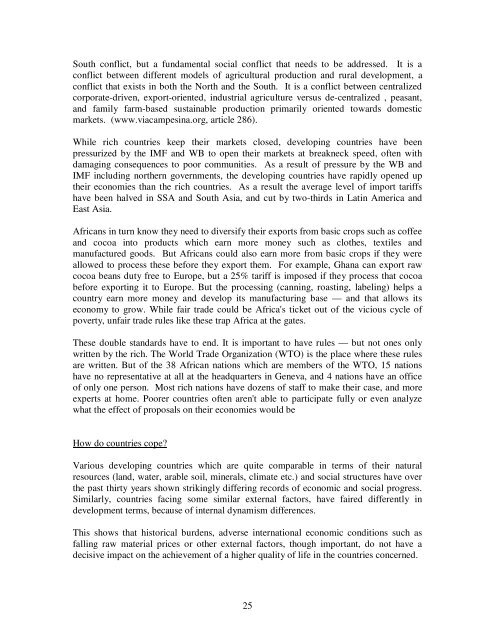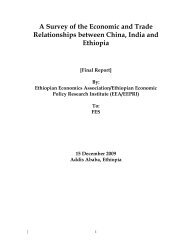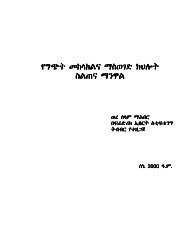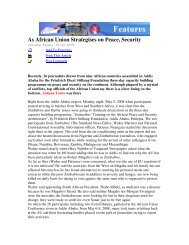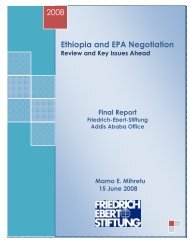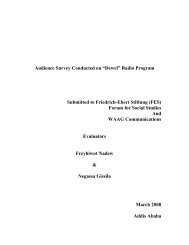external influence in the making of development ... - FES Ethiopia
external influence in the making of development ... - FES Ethiopia
external influence in the making of development ... - FES Ethiopia
You also want an ePaper? Increase the reach of your titles
YUMPU automatically turns print PDFs into web optimized ePapers that Google loves.
South conflict, but a fundamental social conflict that needs to be addressed. It is a<br />
conflict between different models <strong>of</strong> agricultural production and rural <strong>development</strong>, a<br />
conflict that exists <strong>in</strong> both <strong>the</strong> North and <strong>the</strong> South. It is a conflict between centralized<br />
corporate-driven, export-oriented, <strong>in</strong>dustrial agriculture versus de-centralized , peasant,<br />
and family farm-based susta<strong>in</strong>able production primarily oriented towards domestic<br />
markets. (www.viacampes<strong>in</strong>a.org, article 286).<br />
While rich countries keep <strong>the</strong>ir markets closed, develop<strong>in</strong>g countries have been<br />
pressurized by <strong>the</strong> IMF and WB to open <strong>the</strong>ir markets at breakneck speed, <strong>of</strong>ten with<br />
damag<strong>in</strong>g consequences to poor communities. As a result <strong>of</strong> pressure by <strong>the</strong> WB and<br />
IMF <strong>in</strong>clud<strong>in</strong>g nor<strong>the</strong>rn governments, <strong>the</strong> develop<strong>in</strong>g countries have rapidly opened up<br />
<strong>the</strong>ir economies than <strong>the</strong> rich countries. As a result <strong>the</strong> average level <strong>of</strong> import tariffs<br />
have been halved <strong>in</strong> SSA and South Asia, and cut by two-thirds <strong>in</strong> Lat<strong>in</strong> America and<br />
East Asia.<br />
Africans <strong>in</strong> turn know <strong>the</strong>y need to diversify <strong>the</strong>ir exports from basic crops such as c<strong>of</strong>fee<br />
and cocoa <strong>in</strong>to products which earn more money such as clo<strong>the</strong>s, textiles and<br />
manufactured goods. But Africans could also earn more from basic crops if <strong>the</strong>y were<br />
allowed to process <strong>the</strong>se before <strong>the</strong>y export <strong>the</strong>m. For example, Ghana can export raw<br />
cocoa beans duty free to Europe, but a 25% tariff is imposed if <strong>the</strong>y process that cocoa<br />
before export<strong>in</strong>g it to Europe. But <strong>the</strong> process<strong>in</strong>g (cann<strong>in</strong>g, roast<strong>in</strong>g, label<strong>in</strong>g) helps a<br />
country earn more money and develop its manufactur<strong>in</strong>g base — and that allows its<br />
economy to grow. While fair trade could be Africa's ticket out <strong>of</strong> <strong>the</strong> vicious cycle <strong>of</strong><br />
poverty, unfair trade rules like <strong>the</strong>se trap Africa at <strong>the</strong> gates.<br />
These double standards have to end. It is important to have rules — but not ones only<br />
written by <strong>the</strong> rich. The World Trade Organization (WTO) is <strong>the</strong> place where <strong>the</strong>se rules<br />
are written. But <strong>of</strong> <strong>the</strong> 38 African nations which are members <strong>of</strong> <strong>the</strong> WTO, 15 nations<br />
have no representative at all at <strong>the</strong> headquarters <strong>in</strong> Geneva, and 4 nations have an <strong>of</strong>fice<br />
<strong>of</strong> only one person. Most rich nations have dozens <strong>of</strong> staff to make <strong>the</strong>ir case, and more<br />
experts at home. Poorer countries <strong>of</strong>ten aren't able to participate fully or even analyze<br />
what <strong>the</strong> effect <strong>of</strong> proposals on <strong>the</strong>ir economies would be<br />
How do countries cope?<br />
Various develop<strong>in</strong>g countries which are quite comparable <strong>in</strong> terms <strong>of</strong> <strong>the</strong>ir natural<br />
resources (land, water, arable soil, m<strong>in</strong>erals, climate etc.) and social structures have over<br />
<strong>the</strong> past thirty years shown strik<strong>in</strong>gly differ<strong>in</strong>g records <strong>of</strong> economic and social progress.<br />
Similarly, countries fac<strong>in</strong>g some similar <strong>external</strong> factors, have faired differently <strong>in</strong><br />
<strong>development</strong> terms, because <strong>of</strong> <strong>in</strong>ternal dynamism differences.<br />
This shows that historical burdens, adverse <strong>in</strong>ternational economic conditions such as<br />
fall<strong>in</strong>g raw material prices or o<strong>the</strong>r <strong>external</strong> factors, though important, do not have a<br />
decisive impact on <strong>the</strong> achievement <strong>of</strong> a higher quality <strong>of</strong> life <strong>in</strong> <strong>the</strong> countries concerned.<br />
25


